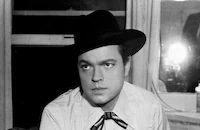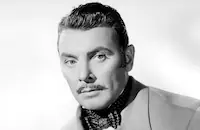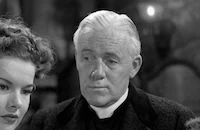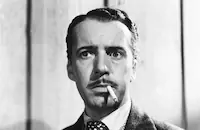Tomorrow Is Forever

Brief Synopsis
Cast & Crew
Irving Pichel
Claudette Colbert
Orson Welles
George Brent
Lucille Watson
Richard Long
Film Details
Technical Specs

Synopsis
In Baltimore, Maryland, on Dec 20, 1918, Elizabeth MacDonald receives word that her husband of one year, John Andrew, has been killed in war-torn France. Devastated by the news, Elizabeth faints on the job at the Hamilton Chemical Works, and is taken in by Larry Hamilton, her caring boss. Larry's maiden aunt Jessie soon informs him that the grief-stricken Elizabeth is pregnant. In a German hospital, meanwhile, the heavily bandaged John is tended to by the understanding Dr. Ludwig. Despite Ludwig's attempts to discover his identity, a depressed, morose John refuses to give his name and is determined to remain an official casualty of the war. Back in Baltimore, Elizabeth gives birth to John Andrew, whom she nicknames "Drew," and accepts the proposal of the devoted Larry. Many years later, as the threat of war in Europe again looms large, Elizabeth adopts an isolationist stand, hopeful that Drew, who is now twenty, will not be called to duty. At the same time, the crippled, scarred John, who lives in Austria and calls himself Erich Kessler, prepares to return to Baltimore with his foster daughter Margaret and work as a chemist at the Hamilton factory. Upon arriving in Baltimore, John takes Margaret to the house in which he and Elizabeth once lived and inquires about its owners. John then reports to his new employer, Larry, and unaware of his connection to Elizabeth, accepts his dinner invitation. John is stunned when he sees Elizabeth for the first time, and while Elizabeth is unable to identify John's surgically altered face, she senses something familiar about him. An anxious John then is introduced to Drew and deduces that he is his son. To Elizabeth's horror, Drew announces after dinner that he wants to join the RAF, which is training in Canada. Later, after Elizabeth has told Drew she will not permit him to enlist, Drew discusses the Nazi situation with John, who has come to the Hamiltons' for lunch and is sympathetic to his son's position. When Drew brings the subject up again at the table, Elizabeth explodes with anger and tells Larry, who supports Drew, that because Drew is not his real son, he cannot know the pain she is feeling. Elizabeth then tells John that he is not welcome at her house anymore, but later apologizes when he reveals that Margaret's real parents, Dr. Ludwig and his wife, were brutally murdered by the Nazis. After John leaves, Elizabeth finds herself reminiscing about her first marriage. Then, on the twenty-first anniversary of that marriage, both Elizabeth and John are drawn back to their old house, and Elizabeth finally confronts John about his identity. Although John repeatedly denies her assertions that he is her long-lost husband, Elizabeth later calls him at work when she discovers that Drew has disappeared. Concerned, John reads a letter that Drew had left for the absent Larry and rushes to the train station to intercept his son. John tells an indignant Drew that he has to wait until he is twenty-one to enlist and threatens to inform the police if he resists. After an exhausted John returns Drew safely home, Elizabeth once again presses him to admit his identity. Instead, John tells Elizabeth that she must stop living in the past and face her fears. Moved by John's thoughtful remarks, Elizabeth gives Drew permission to enlist and explains to him that John interfered so that she could send him off herself. John, meanwhile, collapses at home while burning a cherished love letter from Elizabeth and then dies. The next day, Elizabeth and Larry go to John's place to tell him about Drew and are saddened to learn of his death. When a tearful Margaret tells Elizabeth that John had assured her that she would be there if anything happened to him, Elizabeth embraces the child, confident that "tomorrow is forever."

Director

Irving Pichel
Cast

Claudette Colbert

Orson Welles

George Brent

Lucille Watson

Richard Long

Natalie Wood
John Wengraf
Sonny Howe

Ian Wolfe

Joyce Mackenzie
Michael Ward
Douglas Wood
Tom Wirick
Lane Watson
Henry Hastings
Jesse Graves
Jessie Grayson
Lois Austin
Anne Loos

Irving Pichel
Thomas Louden
Loulette Sablon
Catherine Savitsky
Hilda Tanzler
Lala Detolly
Carmen Beretta
Tina Menard
Carli Elinor
Count Stefenelli
Rudolph Myzet
Charles Faber
Louis Ludwig Lowy
Waclaw Rekwart
Evan Thomas

Charles D. Brown
Milton Kibbee
Frank Chalfant
Jack Lindquist
Eugene Taylor
Bob Tidwell
Michael Hall
Michael Sloane
Buster Phelps
Frank Wyrick
Bill Dyer
Ann Howard
Helen Gerald
Nina Ruth
Bobbie Brooks
Barbara Bletcher
Marguerite Campbell
Betty Greco
Libby Taylor
Sam Wren
Lane Chandler
Jack Cheatham
Mike Donovan

Boyd Irwin
Crew
Roy Clark
Lenore Coffee
Louis Forbes
Wiard Ihnen
Arthur Johns
Corson Jowett
Paul Lerpae
David Lewis
Jean Louis
Paul Neal
Ernest Nims
Gustaf Norin
John Sherwood
Max Steiner
Max Steiner
Charles Tobias
Joe Valentine

Photo Collections
Videos
Movie Clip


Film Details
Technical Specs

Articles
Tomorrow Is Forever - Tomorrow is Forever
Even though Pichel had promised only a test, nothing more, Natasha's mother packed up the family and moved to Hollywood, where Natasha promptly flunked the screen test by not crying on cue. That didn't dismay Mom, however. She marched into Pichel's office at Fox and charmed him into giving her daughter another chance. This time Natasha was coached beforehand to remember the sight of her dying dog, and sure enough, the tears flowed and she got the part. The only problem was her name. Pichel didn't like it, so following in the great tradition of Hollywood stardom, he gave her a new one. "Natasha" became "Natalie," and "Gurdin" became "Wood" (after Pichel's good friend, director Sam Wood). Natalie Wood was born.
Young Natalie's part was a good one - playing the adopted daughter of Orson Welles's character, no less. The grand weepie of a story finds Welles and Claudette Colbert getting married just before Welles goes off to fight WWI. He is wounded and disfigured, and rather than return home to his wife and new son this way, he chooses to be reported as dead, settling down in Austria under a new identity. Colbert, overcome with loneliness, eventually remarries (her new husband is played by George Brent). Many years later Welles re-enters her life, accompanied by adopted war orphan Natalie Wood, and old feelings arise. Like so many melodramas of the time, the story may be preposterous, but it is lent compassion and sensitivity by a talented cast and crew. (The story had been used before for The Man from Yesterday [1932], also starring Colbert.)
Orson Welles at this point of his career was actually much more interested in the political column he was writing for the New York Post than he was in movies, and he was even contemplating running for office. He announced that his Hollywood work would be limited to acting in one picture a year. In other words, acting was simply a means for a paycheck. Nonetheless, he turned in a fine, sensitive performance here, complete with a convincing Austrian accent. Natalie Wood later recalled, "People said Orson Welles was overpowering and theatrical, but I found him most kind."
But it was the elegant Claudette Colbert who really made an impression on Wood and Richard Long (who played her son), coaching and encouraging them constantly. Wood remembered, "Claudette was the one who was really wonderful - so kind and maternal, such a loving woman. I always felt sad somehow that in real life, for whatever reason it was, Claudette never became a mother, for she had so much to give that way. Maybe it was her actual childlessness that made her so exceptionally sensitive and empathetic when she worked with children."
Richard Long echoed these sentiments. "I was just out of high school, seventeen years old and scared as hell. Tomorrow is Forever was my first picture, and playing Claudette's son was the break of my life. Of course I was green and awkward, and I know she sensed my hesitancies and doubts. I always felt that in the complicated scenes I had to do with her that she was playing back specially to me, her eyes willing ease and encouragement. I know I played off her eyes, often. Claudette was a woman of great dignity, and for all her warmth, had a kind of charming reserve."
The lives of both child stars would end in tragedy. Long married a beautiful young actress, Suzan Ball, who died at age 22 from cancer. Long himself died of a heart condition in 1974, at age 47. A few years later Wood drowned in a Catalina boating accident at age 43. Colbert, who at the time of Wood's death was appearing on Broadway, remarked sadly, "Dick, poor Dick, and now our little Natalie. Both of them gone so young and here I am." Colbert would live until 1996, reaching the ripe old age of 92.
Director Irving Pichel (pronounced "Peekle"), an actor himself, here took the voice role of a radio commentator. He remained very close friends with Natalie and her mother and directed Natalie once more, in The Bride Wore Boots (1946).
Producer: David Lewis
Director: Irving Pichel
Screenplay: Gwen Bristow (story), Lenore J. Coffee
Cinematography: Joseph Valentine
Film Editing: Ernest Nims
Art Direction: Wiard Ihnen
Music: Max Steiner
Cast: Claudette Colbert (Elizabeth Hamilton), Orson Welles (John Andrew MacDonald/Erik Kessler), George Brent (Lawrence Hamilton), Lucile Watson (Aunt Jessica Hamilton), Richard Long (John Andrew Hamilton), Natalie Wood (Margaret Ludwig).
BW-104m.
by Jeremy Arnold

Tomorrow Is Forever - Tomorrow is Forever
Quotes
Trivia
Notes
Gwen Bristow's novel was first published in the May 1944 issue of Ladies Home Journal. According to a November 1943 Hollywood Reporter news item, Irene Dunne was considered for the film's lead along with Claudette Colbert. According to modern sources, director Irving Pichel cast Natalie Wood after she impressed him with her performance in a bit part in the 1943 picture Happy Land . In a pre-production Hollywood Reporter news item, Art Black was announced as Pichel's assistant; John Sherwood is credited onscreen in that capacity, however. A June 1945 Hollywood Reporter news item indicates that James Jordan, Jr. was cast in the picture, but his appearance in the completed film has not been confirmed. According to an August 1945 Hollywood Reporter news item, the film was banned in Aiken, SC after Orson Welles began a public campaign to find the "sadistic police officer" who was accused of blinding a black soldier in that city. In a modern interview, Welles commented that he acted in Tomorrow Is Forever only for the money and contributed very little to the production. Claudette Colbert reprised her role in a Lux Radio Theatre broadcast on May 6, 1946, co-starring Van Heflin, and on January 13, 1950, Colbert performed in a Hallmark Playhouse adaptation, co-starring Jeff Chandler.














